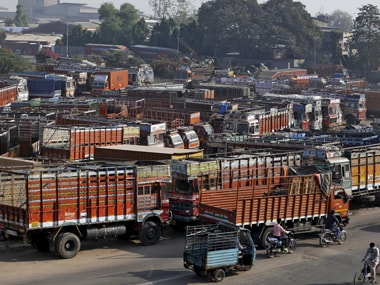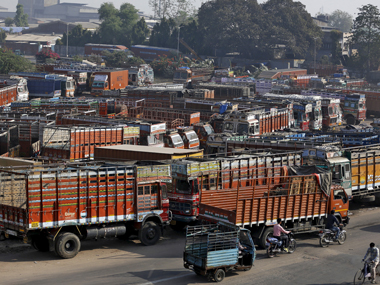The crucial meeting of the GST council that was to happen on 25 November has been cancelled. No new date had been finalised, as of 24 November. Prior to the postponement, the GST negotiations between the state finance ministers and the Union government had hit a roadblock after it was exposed that the Union government had been allegedly concealing true data from the state finance ministers during a large part of the negotiations . The present stalemate is around the issue of jurisdiction on the service taxpayers in the under Rs 1.5 crore revenue category. That the Union government has presented misleading data to state finance ministers that hugely under represents the actual taxpayer base size is a pretty serious affair. It’s not surprising that it didn’t make big letter headlines given how the Delhi-based think-tanks and a segment of the business media is cheering for the Union government’s side in the GST negotiations. This sort of thing should have ended the GST negotiations altogether, but the state governments have greater faith in cooperative federalism than the Union government had. [caption id=“attachment_2940664” align=“alignleft” width=“380”]  Representational image. Reuters[/caption] Now that this is out in the open, Arun Jaitley is finding it difficult to defend the Union’s claims on a tax base that he earlier took for granted, given the allegedly misleading information that was fed by the Union government officials to the state finance ministers. Now, those “gains” by the Union government, based on allegedly previously concealed information, is suddenly up for negotiation and grabs. The future of this negotiation will decide a very crucial issue of federalism in the Indian Union – would the states retain any serious amount of revenue autonomy at all or will they become total beggars seeking alms in the court of the New Delhi Empire. Let us understand the implications of this alleged concealment of data. The crucial issue is, who will control the service tax base for entities under the Rs 1.5 crore annual revenue threshold. This is not a theoretical argument but one that is premised on numbers – the most crucial among which is the actual size of this under Rs 1.5 crore revenue service tax payer base. In the initial meeting of the GST council, service taxpayer data supplied by the Union government to the state finance ministers showed a service taxpayer base of 11 lakh. Negotiations thus happened on the basis of this number, which the state finance ministers in good faith believed to be true. One does not expect that in a crucial forum like the GST council, the Union government would be concealing real information and feed allegedly misleading information. Based on that 11 lakh number and its estimated revenue corpus, the states were magnanimous to the Union and decided to let the Union government retain control of the under Rs 1.5 crore annual revenue service tax base. Everything changed turned out that this 11 lakh number that was supplied by the Union government to the state finance ministers was deemed to be misleading by them. New data available with the state finance ministers suggest that the actual service taxpayer base with below Rs 1.5 crore annual revenue is almost 31 lakh! That is almost 3 times the number that the Union government fed the state finance ministers earlier. Chairman of the empowered group of state finance ministers, West Bengal’s Finance Minister Amit Mitra has directly accused the Union government of concealing service taxpayer information from the states. A three-times increase in tax payer base has very different revenue implications. On the basis of that, a majority of the states have now proposed that for the under Rs 1.5 crore revenue class, state governments will have full control of both goods and service taxes, while for the over Rs 1.5 crore slab, there will be dual control and revenue sharing between the States and the Union. Any entity whose bluff has been called out so directly would be embarrassed and would respond directly to the serious allegations that have been raised. Not, so the Union government. It has refused to agree to the formula proposed by a majority of the states, including Kerala, Bengal, Tamil Nadu, Bihar, Delhi, Odisha and others. Thus the stalemate continues. It is unfortunate when a 31 percent vote share government has the power to hold at ransom the united political decision of a majority of state governments. That is a fundamental flaw in the federal structure of the Indian Union. In the 4 November meeting of the GST council, the state finance ministers wanted updated data on assesses of service tax, excise and VAT. Without giving updated data to state finance ministers on such crucial matters, what is the point of a GST council meeting? Was the Union government thinking that the GST council will be a tea-drinking, rubber-stamp club for New Delhi’s decisions? After the state finance ministers raised a cry based on the new data on service taxpayer base, the Union government tried to counter that by calling for a “re-opening” of the settled decision. The goods and services issues are not equivalent. The service taxpayer base issue was “settled” earlier based on false date. Updated data that shows the actual base to be nearly 3 times larger than what the Union government’s earlier allegedly misleading numbers showed has resulted in this justified calls for negotiations from a majority of the states. There has been no such corresponding allegation of concealment from the states about the goods taxpayer base. The Union government has retained the right to impose cess at will. Thus, it has a rate elastic source of revenue. The state governments, on the other hand, after GST proposals, have not been left with any elastic source of revenue. Thus, Union will generate its own revenue in response to what it deems as an emergency. The states will have to go with a begging bowl to Delhi in a similar situation. This is unjust and a blow to the powers and dignity of the states. Also, the upper slab of luxury goods, which represents a whopping 25 percent of the total indirect tax base, has been forcibly kept low on Union government’s insistence since it wants to add cess over it, which it does not have to share with the states. Thus, Union already wants to deprive states from their legitimate revenue claims in the top-most tier. Either states should also have the power to impose cess or the highest slab has to be revised upwards significantly to squeeze the space for Union cess. Otherwise this becomes another way where states will be deprived of their rightful revenue. One hopes that the BJP will not be so shameless to introduce the GST bill as a money bill and silence the Opposition in Rajya Sabha. This too after getting immense cooperation extended by most of the opposition in spite of many reservations and concerns about GST that the opposition had voiced during the parliamentary GST debate. The states, by agreeing to GST, have given up exclusive revenue powers. By dangling deadlines and roll-out dates and its pressure tactics via big corporate controlled industry bodies, the Union will try to force the state into a dishonourable and damaging settlement. It is up to the states to stand up to this blackmail coming from same Union government that has allegedly misled state governments by giving wrong information during crucial GST council meeting. This is about the future federalism in the Indian Union and preservation of the basic structure of the Constitution of India. If the state governments do not have exclusive control over any part of the tax-payer base, it will mean that the federal structure of the Indian Union will be damaged permanently. Any union government that misleads state government by concealing revenue data does not have any moral or ethical right to claim jurisdiction over the revenue sources situated in states.
Arun Jaitley is finding it difficult to defend the Union’s claims on a tax base that he earlier took for granted, given the allegedly misleading information that was fed by the Union government officials to the state finance ministers
Advertisement
End of Article


)

)
)
)
)
)
)
)
)



